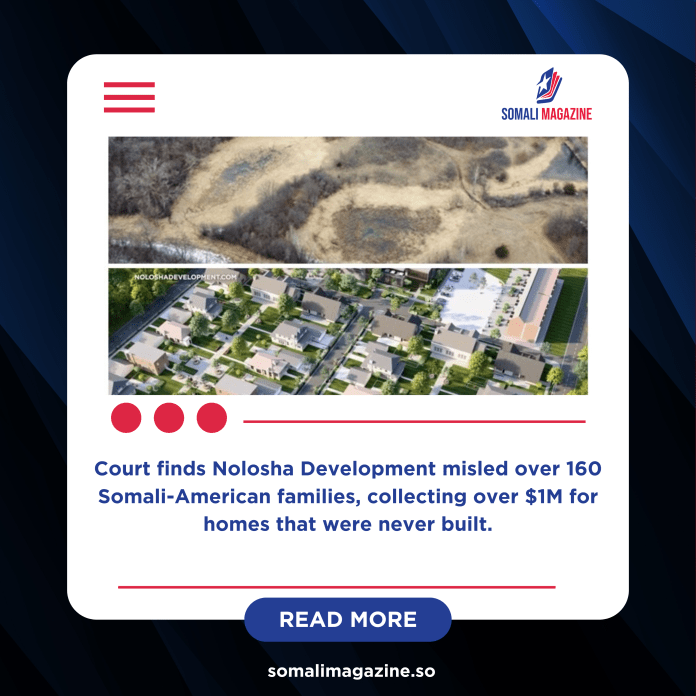Facebook Twitter (X) Instagram Somali Magazine - People's Magazine
A Minnesota judge has ruled that Nolosha Development and its CEO, Abdiwali Abdullahi, must repay Somali-American families who lost money after paying deposits for homes that were never built.
The ruling, made this week by Judge Christian Sande in Dakota County, comes after a civil fraud lawsuit filed by Minnesota Attorney General Keith Ellison. The lawsuit claimed that Nolosha Development took money from families for a housing project in Lakeville that never had land, building permits, or funding.
The court found that the company violated several state laws, including the Prevention of Consumer Fraud Act and the False Statement in Advertising Act. The judge said that Nolosha and Abdullahi ignored repeated court orders and failed to provide important documents, showing a clear pattern of non-cooperation.
“The court gave the defendants many chances to participate and defend themselves,” Judge Sande wrote. “But they chose not to.”
A separate hearing will be held to decide how much money the company must repay. So far, officials believe that at least 160 families, most of them Somali immigrants, paid deposits as high as $25,000. In total, the company collected over $1 million.
Nolosha had promoted the housing project as the first Somali-focused development in Minnesota. They promised lakefront homes, a mosque, halal markets, an Islamic school, and a no-interest 20-year mortgage plan. The promises attracted many hopeful buyers who saw this as a way to own homes that followed Islamic financial principles.
But investigations found that Nolosha never actually owned the land. A deal to buy the 37-acre site in Lakeville was canceled in December 2024 after the company missed multiple deadlines. The land is now linked to a separate federal case involving a $250 million fraud connected to the Feeding Our Future program.
Lakeville’s Planning Manager confirmed that the city never received any formal plans from Nolosha, and the land itself had development challenges like wetlands and difficult topography.
Many families say they were misled. In sworn statements, buyers said they were promised homes by November 2023, with matched deposits and halal financing. But as months passed, the project never began, and refund checks began bouncing. Several clients said Nolosha stopped responding to their calls and emails.
“What was supposed to be an amazing gift for our son has turned into a nightmare,” one buyer, Abdulkarim Mohamud, wrote in a sworn statement.
The Attorney General’s Office began investigating in 2023 after whistleblowers raised concerns. The lawsuit was officially filed in October 2024, accusing Nolosha of making false claims about what they were offering.
“If you are selling something, you have to be honest about what you’re selling,” Ellison said in a press release. “Taking large payments and then failing to deliver is simply fraud.”
In a court hearing in April 2025, Abdullahi admitted the company could no longer afford a lawyer and blamed the project’s failure on negative media coverage and the Attorney General’s investigation. He claimed to be working on a new plan to raise money but failed to follow through.
Judge Sande refused to delay the case, calling the situation “preposterous.” In earlier hearings, he had warned Abdullahi to take the case seriously.
While some buyers received partial refunds, many were charged penalties—despite never receiving a home. Nolosha also kept a waitlist of over 1,500 hopeful buyers throughout the process.
The FBI is now investigating Nolosha in addition to the state’s civil case. The Attorney General’s Office has promised to keep fighting for full refunds for affected families.

